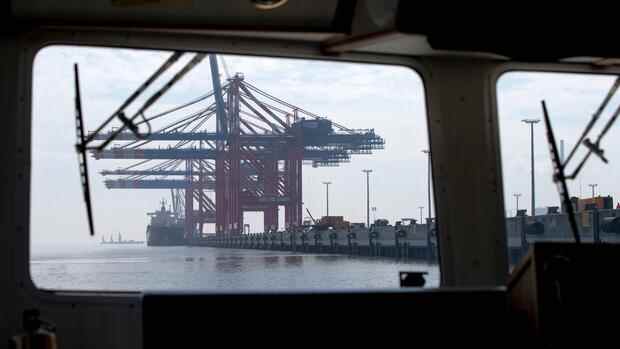The Hapag-Lloyd shipping company has acquired a stake in the container port – just one of many deals in the logistics industry.
(Photo: imago stock&people)
The wave of takeovers in the international freight industry is at record levels. The auditing company PwC listed 322 deals with a total amount of 219 billion US dollars in the past year. In the first half of 2022, another 129 were added for a total of $126 billion.
Strengthening their supply chains is important to the company buyers, say some, while others cite the low euro exchange rate as an opportunity for their takeovers. Almost everyone is hiding the real reason, probably for fear of a debate that would be uncomfortable for them: the large amount of money that flows into airline holdings, transport companies and port terminals comes from veritable crisis profits.
In some cases, the logistics groups even fueled the development themselves. Right at the beginning of the corona pandemic, the shipping companies shut down parts of their fleets. The resulting supply bottlenecks caused the movement of goods to be out of step. Empty containers ended up in the wrong places, blockages in the ports meant that overseas deliveries could no longer flow as usual.
Port operators such as HHLA from Hamburg or DP World from Dubai made money from the excessively long standing fees for undelivered containers, while shipping companies collected exorbitant freight rates from exporters desperately waiting for shipments – sometimes with imaginative surcharges. As a result, transport companies such as Maersk, CMA CGM and Hapag-Lloyd almost increased their net profits tenfold – even though their service to customers collapsed.
Top jobs of the day
Find the best jobs now and
be notified by email.
Similar to the European energy companies, which have been earning enormous sums from the high gas prices for months, the EU should also pursue such excess profits in logistics for reasons of justice. At the end of September, Commission chief Ursula von der Leyen finally agreed with the energy ministers to ask gas, coal and oil companies, refineries and providers of renewable energies to pay.
Corporations benefit doubly from globalization
Depending on the EU state, solidarity taxes of 33 percent are to be paid on profits for the current year that are 20 percent above the average for the past three years.
The bad news for the tax authorities and long-suffering logistics customers: It can be ruled out that shipping companies, air freight providers, forwarding companies or port operators will skim off similar profits. The industry is so international that unilateral orders from Brussels would be tantamount to significant distortions of competition. It thus benefits twice over from globalization.
More: Arab investors are reaching for German logistics – and increasing the pressure on established freight forwarders
